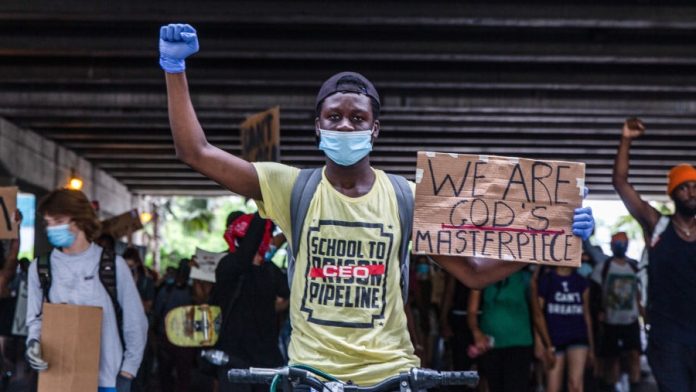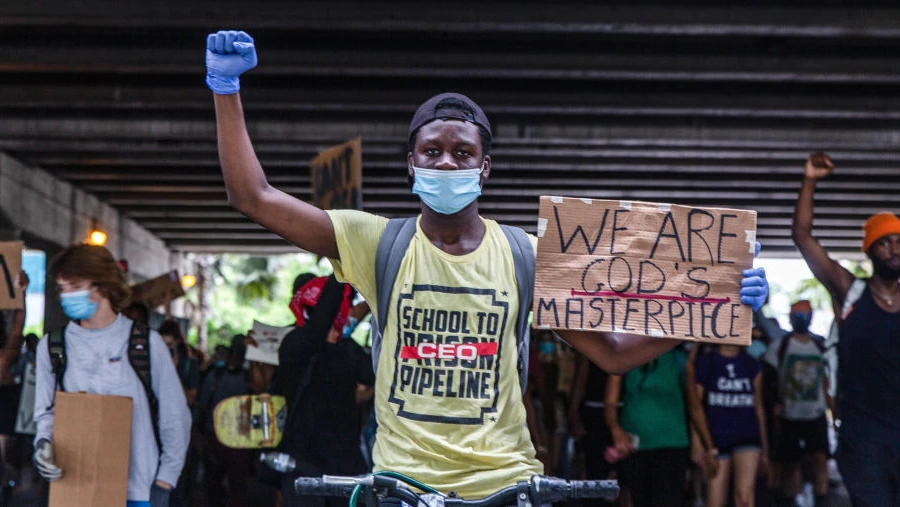[ad_1]

Since last week, protests have erupted in over 300 cities nationwide against the endless police violence waged against Black people. The protests emerged in the wake of a string of high-profile police killings, including those of Breonna Taylor and David McAtee in Kentucky, Sean Reed in Indianapolis, Tony McDade in Florida, George Floyd in Minnesota, and Ahmaud Arbery, who was fatally shot by a retired police officer and his son in Glynn County, Georgia.
While in the midst of a global pandemic that has already taken over 100,000 lives in the U.S. alone, thousands of protestors have had to make the difficult choice between protecting their own health by staying at home or taking direct action to end state-sanctioned murders—knowing that Black lives hang in the balance either way. For many, however, protesting is either not feasible or represents a risk they aren’t willing to take. Even so, here are four other meaningful ways to get involved and learn more about what this moment is about, what set it in motion, and what it means for our nation’s future.
1. Support those on the ground
Before making donations, do some research and prioritize bail funds that might be smaller and have less resources. Some more well-known groups that have received an overwhelming influx of donations, like the Brooklyn Community Bail Fund, have already started to redirect their funds to other organizations.
Read More: An open letter to my white ‘friends’ who remain silent
If you’re in the financial position to do so, consider making this an ongoing practice for the duration of the uprising as well as after. The problems inherent in wealth-based detention extend beyond just this moment. You can set recurring donations to one or two groups, get your friends and family involved by sharing links to and assigning funds to each person, or carve out some time in your schedule every day to do research and make small daily donations to different organizations.
There are also other ways to support protestors that you might know in your personal life. If you have friends or neighbors who are choosing to take to the streets, you can offer to create supply kits for them with masks, gloves, water, food, sanitizer, hair ties, and other necessities that they’ll need to help remain safe. Also, consider serving as their emergency point person: They’ll check in with you when they arrive at the protest, when they leave, and when they safely return home. In case they are hurt or are arrested, make sure you have the names and phone numbers of some contacts that they’d like you to reach out to on their behalf. Be sure to keep on hand a few numbers of pro bono attorneys as well.
2. Know the demands
Regardless of your prior activism, it’s crucial to learn about what people are fighting for right now so that you can help explain those ideas to people in your network who might be holding some misconceptions.
3. Understand their context
Once we know the demands, we can move toward sharpening our understanding of the actual systems that created the injustices organizers are now seeking to dismantle. Not being out on the street does not have to preclude anyone from deepening their knowledge about the police as well as the tactics that protesters are using to advocate against them.
To do this requires a fundamental shift and reorienting of how we have come to think about policing and the role it plays in our society.
It also challenges us to contemplate the idea of “peaceful protest” and reconsider how and where violence has shown up in past social movements. Check out these pieces as starting points on the road to building your understanding of this moment, the historical timeline it lies within, and alternatives for the future:
4. Honor Black lives by remembering Black lives
George Floyd was a father of two and he enjoyed making customers laugh at Conga Latin Bistro, the dance club where he served as a bouncer.
Breonna Taylor was described by her aunt as “the baby of the family.” She worked as an EMT at two hospitals during the onset of the pandemic and had aspirations of becoming a nurse, buying a house, and raising a family.
David McAtee dreamed of owning a restaurant one day, but in the meantime he ran a popular outdoor BBQ eatery, often feeding people—including police officers—for free.
The details of their lives matter as much as the stories of their deaths. Spend some time either alone or in your community to learn about and reflect upon the lives that were lost at the hands of those who had sworn to protect them.
*The author previously worked at Color Of Change between 2018 and 2020.
[ad_2]
Source link

